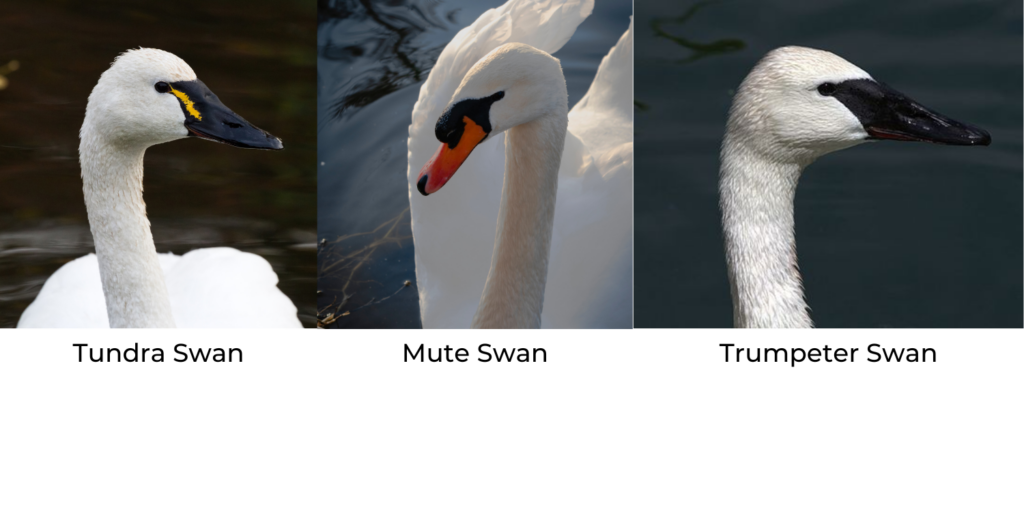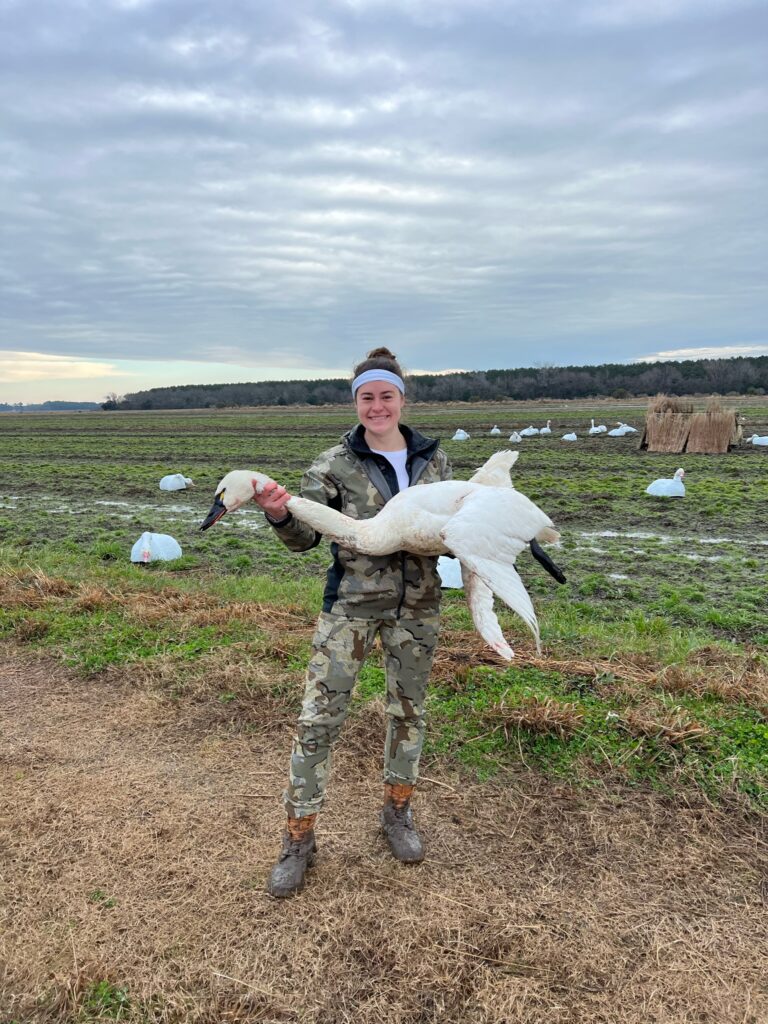The North Carolina Swan Tag
Swans are beautiful birds, and as such, are represented in cultural pieces spanning thousands of years. From Greek mythology, to Christmas carols, to children’s books, swans represent peace, love, fidelity, and other virtues. It is no wonder that the public sentiment towards these big birds is romanticized, to say the least.
There are three species of swan in North America: the trumpeter swan, the tundra swan, and the nonnative mute swan (a Eurasian species), with the tundra swan being the most populous. Global populations for the tundra swan are at approximately 280,000; the Trumpeter Swan at approximately 63,000; and the Mute Swan at approximately 400,000. Despite the mute swan’s fame from The Ugly Duckling, according to the USDA, as a nonnative species, damage from the Mute swan “includes competing with native waterfowl, destroying native plants, spreading disease, and colliding with aircraft. They are also considered a nuisance in some areas due to their abundant fecal droppings and aggressiveness towards people.” Management is imperative to keep this damage to a minimum and to promote resources for native swan species and other waterfowl.

Hunting – a primary management and conservation tool for wildlife – of swans is allowed in Alaska, Utah, Nevada, North Carolina, Virginia, Delaware, North Dakota, South Dakota, Montana, and Idaho. The most widely hunted is the Tundra swan, and swan hunting has directly led to an increase in swan populations over the past several decades. Like other waterfowl conservation, in order to hunt the hunter must purchase a federal waterfowl stamp, a state hunting license, and a state waterfowl stamp, permit, or tag. These revenues, in addition to the excise tax on firearms and ammunition through Pittman-Robertson, go towards federal and state conservation efforts, habitat protection and optimization, law enforcement, and direct species conservation projects.
While management differs from state to state, swans can only be hunted if the hunter draws a tag. For example, in the popular swan hunting destination of North Carolina, there are only 6,000 tags available. This science-based quota provides management funding, ensures that they are not over hunted, and provides a unique hunting opportunity for sportsmen. Hunters from in and out of state in turn support local guides and outfitters, who are often on the frontlines of habitat optimization and anti-poaching. This system puts a value on swans, which otherwise can easily become nuisances without benefit. In short, hunting swans ensure that there will be swans for years to come.
While conservation is a critical aspect of swan hunting, there are many more reasons to apply for a tag. Anyone who has gone will say it is thrilling, with these massive birds flying in like bomber airplanes. The wind whirring through their wings adds to this effect, and their quick flight brings a challenge to shooting. They are absolutely beautiful and knocking one out of the sky is one of the most rewarding waterfowl experiences. My fiancé and I were fortunate to draw tags and got our first swans this year in North Carolina. We went with a guide who is active with Cross Trail Outfitters, a Christian non-profit that introduces youth to hunting across the country.

We set up the blind and decoys in a soggy field before sunrise and waited. First, we saw a lone juvenile circling and decided to wait for a pair of mature birds. A few circled a while later but would not come in close enough. In the meantime, we learned all about swan behavior, our guide’s hunting background, his work in the nonprofit, and how he manages waterfowl habitat. There were a few crazy stories thrown in there too. After a few hours of waiting, finally, a pair of two birds started circling, almost within range. We sat frozen, hoping they would commit. On a wide pass, and although we couldn’t see them with our heads hunkered down in the blind, we knew they were close enough from the sound of the wind whistling through their wings; we jumped up, shot, and down went two beautiful birds. With big smiles on our faces, we stayed on for the rest of the morning just to watch hundreds more swans come into the field and enjoy the experience. Our adventure shows what hunters around the world will tell you; that you meet the best people hunting, it’s more than just shooting a bird, and that hunters overwhelmingly care about making the world a better place.
Despite all these benefits, swan hunting is frowned upon by the general population due to their charisma and cultural identity. Even people who support hunting, and even some hunters, dislike the idea of hunting these white birds. As hunters, we often care more about the species we pursue than anyone else. We get to know their characteristics and behavior, we play an active role in management, and we contribute more than any other group to conservation. Hunting of swans ensures that we will have healthy and sustainable populations for years to come, just like every other hunted species. For hunters, it is about the full experience and means much more to us than a children’s tale or Greek myth. Hunting is not only legally and ethically done, but it is an activity that gives back tenfold to conservation. Other people’s emotions should never convince you to feel bad for taking a legal animal. No matter what, where, or how you hunt – from swans, to partridge, to ostrich, to turkey – SCI defends your freedom to do it. Join as a member today and stand First For Hunters!

